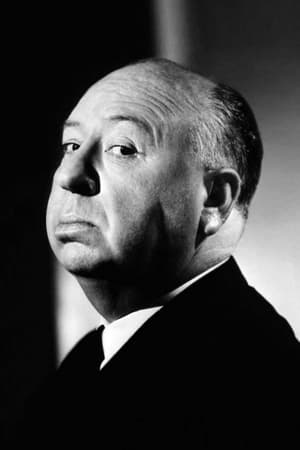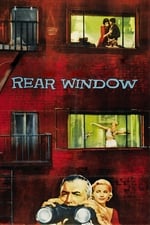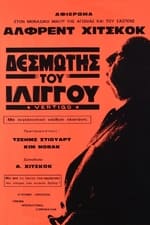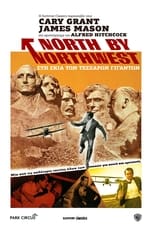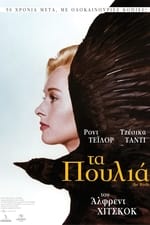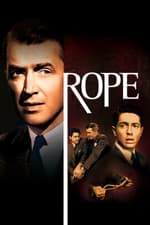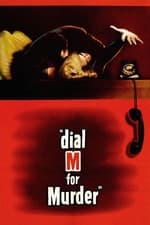Información personal
Conocido por Dirección
Créditos conocidos 169
Sexo Masculino
Fecha de nacimiento 13 de agosto de 1899
Fecha de defunción 29 de abril de 1980 (80 años)
Lugar de nacimiento Leytonstone, London, England, UK
También conocido como
- Hitch
- The Master of Suspense
- Sir Alfred Hitchcock
- Альфред Хичкок
- 亞弗列·希治閣
- อัลเฟรด ฮิตช์ค็อก
- アルフレッド・ヒッチコック
- ألفريد هتشكوك
- 알프레드 히치콕
- אלפרד היצ'קוק
- Άλφρεντ Χίτσκοκ
- Sir Alfred Joseph Hitchcock
- آلفرد هیچکاک
- Alfred Joseph Hitchcock
- 앨프리드 히치콕
- 阿尔弗雷德·希区柯克
Puntuación del contenido
100
¡Sí! ¡Buena pinta!
Iniciar sesión para informar de un problema
Biografía
Sir Alfred Joseph Hitchcock, KBE (13 August 1899 – 29 April 1980), was an English director and producer. Labeled as the "Master of Suspense", he became known for thrillers, often combined with a dark sense of humor. After a successful career in his native country, Hitchcock moved to Hollywood in 1939. Over a career spanning more than half a century, Hitchcock fashioned for himself a distinctive and recognizable directorial style. He pioneered the use of a camera made to move in a way that mimics a person's gaze, forcing viewers to engage in a form of voyeurism. He framed shots to maximize anxiety, fear, or empathy, and used innovative film editing. His stories frequently feature fugitives on the run from the law alongside icy blonde female characters. Many of Hitchcock's films have twist endings and thrilling plots featuring depictions of violence, murder, and crime, although many of the mysteries function as decoys —or MacGuffins— meant only to serve thematic elements in the film and the extremely complex psychological examinations of the characters. Hitchcock's films also borrow many themes from psychoanalysis and feature strong sexual undertones. Through his cameo appearances in his own films, interviews, film trailers, and the television program Alfred Hitchcock Presents (1955-1965), he became a cultural icon.
Hitchcock is widely regarded as one of the most influential figures in the history of cinema. In 2002, Hitchcock was ranked 2nd behind Orson Welles in the critics' top ten poll in the list of The Greatest Directors of All Time compiled by the Sight & Sound magazine. Andrew Sarris in his influential book of film criticism The American Cinema: Directors and Directions 1929–1968 included him in the "pantheon" of the 14 greatest film directors who had worked in the United States.
Hitchcock's critically most acclaimed film is the psychological thriller film Vertigo (1958). Although being a mild failure upon its release, it has risen in popularity over the decades. In 2012 it even replaced Orson Welles' Citizen Kane as the greatest film ever made in the Sight & Sound critics' poll. Regarding visual style, Vertigo is often declared as Hitchcock's most perfect film. The use of color symbolism, meticulously composed shots, and the famous "Vertigo effect" (dolly zoom) continue to be studied and admired.
Hitchcock's most commercially successful and most famous film is Psycho (1960), which had a significant impact on the horror genre, especially the slasher film. Hitchcock was able to prove his skills with the mystery thriller film Rear Window (1954), to create suspense within a confined setting - primarily the protagonist's apartment. In this film, voyeurism, one of Hitchcock's favorite subjects, is an essential aspect.
Many of Hitchcock's spy films, most notably North by Northwest (1959) and Notorious (1946), had a major impact on the Mission: Impossible and James Bond series.
Sir Alfred Joseph Hitchcock, KBE (13 August 1899 – 29 April 1980), was an English director and producer. Labeled as the "Master of Suspense", he became known for thrillers, often combined with a dark sense of humor. After a successful career in his native country, Hitchcock moved to Hollywood in 1939. Over a career spanning more than half a century, Hitchcock fashioned for himself a distinctive and recognizable directorial style. He pioneered the use of a camera made to move in a way that mimics a person's gaze, forcing viewers to engage in a form of voyeurism. He framed shots to maximize anxiety, fear, or empathy, and used innovative film editing. His stories frequently feature fugitives on the run from the law alongside icy blonde female characters. Many of Hitchcock's films have twist endings and thrilling plots featuring depictions of violence, murder, and crime, although many of the mysteries function as decoys —or MacGuffins— meant only to serve thematic elements in the film and the extremely complex psychological examinations of the characters. Hitchcock's films also borrow many themes from psychoanalysis and feature strong sexual undertones. Through his cameo appearances in his own films, interviews, film trailers, and the television program Alfred Hitchcock Presents (1955-1965), he became a cultural icon.
Hitchcock is widely regarded as one of the most influential figures in the history of cinema. In 2002, Hitchcock was ranked 2nd behind Orson Welles in the critics' top ten poll in the list of The Greatest Directors of All Time compiled by the Sight & Sound magazine. Andrew Sarris in his influential book of film criticism The American Cinema: Directors and Directions 1929–1968 included him in the "pantheon" of the 14 greatest film directors who had worked in the United States.
Hitchcock's critically most acclaimed film is the psychological thriller film Vertigo (1958). Although being a mild failure upon its release, it has risen in popularity over the decades. In 2012 it even replaced Orson Welles' Citizen Kane as the greatest film ever made in the Sight & Sound critics' poll. Regarding visual style, Vertigo is often declared as Hitchcock's most perfect film. The use of color symbolism, meticulously composed shots, and the famous "Vertigo effect" (dolly zoom) continue to be studied and admired.
Hitchcock's most commercially successful and most famous film is Psycho (1960), which had a significant impact on the horror genre, especially the slasher film. Hitchcock was able to prove his skills with the mystery thriller film Rear Window (1954), to create suspense within a confined setting - primarily the protagonist's apartment. In this film, voyeurism, one of Hitchcock's favorite subjects, is an essential aspect.
Many of Hitchcock's spy films, most notably North by Northwest (1959) and Notorious (1946), had a major impact on the Mission: Impossible and James Bond series.
Dirección
|
||||||||||||
|
||||||||||||
|
||||||||||||
|
||||||||||||
|
||||||||||||
|
||||||||||||
|
||||||||||||
|
||||||||||||
|
||||||||||||
|
||||||||||||
|
||||||||||||
|
||||||||||||
|
||||||||||||
|
||||||||||||
|
||||||||||||
|
||||||||||||
|
||||||||||||
|
||||||||||||
|
||||||||||||
|
||||||||||||
|
||||||||||||
|
||||||||||||
|
||||||||||||
|
||||||||||||
|
||||||||||||
|
||||||||||||
|
||||||||||||
|
||||||||||||
|
||||||||||||
|
||||||||||||
|
||||||||||||
|
||||||||||||
|
||||||||||||
|
||||||||||||
|
||||||||||||
|
||||||||||||
|
||||||||||||
|
||||||||||||
|
||||||||||||
|
||||||||||||
|
||||||||||||
|
||||||||||||
|
||||||||||||
|
||||||||||||
|
Interpretación
|
||||||||||||||||||
|
||||||||||||||||||
|
||||||||||||||||||
|
||||||||||||||||||
|
||||||||||||||||||
|
||||||||||||||||||
|
||||||||||||||||||
|
||||||||||||||||||
|
||||||||||||||||||
|
||||||||||||||||||
|
||||||||||||||||||
|
||||||||||||||||||
|
||||||||||||||||||
|
||||||||||||||||||
|
||||||||||||||||||
|
||||||||||||||||||
|
||||||||||||||||||
|
||||||||||||||||||
|
||||||||||||||||||
|
||||||||||||||||||
|
||||||||||||||||||
|
||||||||||||||||||
|
||||||||||||||||||
|
||||||||||||||||||
|
||||||||||||||||||
|
||||||||||||||||||
|
||||||||||||||||||
|
||||||||||||||||||
|
||||||||||||||||||
|
||||||||||||||||||
|
||||||||||||||||||
|
||||||||||||||||||
|
||||||||||||||||||
|
||||||||||||||||||
|
||||||||||||||||||
|
||||||||||||||||||
|
||||||||||||||||||
|
||||||||||||||||||
|
||||||||||||||||||
|
||||||||||||||||||
|
||||||||||||||||||
|
||||||||||||||||||
|
||||||||||||||||||
|
||||||||||||||||||
|
||||||||||||||||||
|
||||||||||||||||||
|
||||||||||||||||||
|
||||||||||||||||||
|
||||||||||||||||||
|
||||||||||||||||||
|
||||||||||||||||||
|
||||||||||||||||||
|
||||||||||||||||||
|
||||||||||||||||||
|
||||||||||||||||||
|
||||||||||||||||||
|
||||||||||||||||||
|
||||||||||||||||||
|
||||||||||||||||||
|
||||||||||||||||||
|
||||||||||||||||||
|
||||||||||||||||||
|
Producción
Guion
|
||||||
|
||||||
|
||||||
|
||||||
|
||||||
|
||||||
|
||||||
|
||||||
|
||||||
|
||||||
|
||||||
|
||||||
|
Arte
|
||||||||||||
|
||||||||||||
|
||||||||||||
|
||||||||||||
|
||||||||||||
|
||||||||||||
|
Equipo
|
||||||
|
||||||
|
||||||
|
||||||
|
||||||
|
Creador
|
|||
|
|||
|
|||
|
Edición
|
